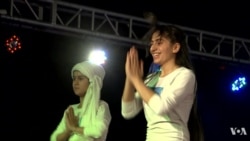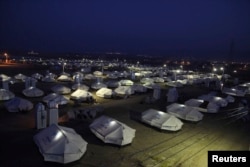Under a full moon, a dust-filled wind and the driving sounds of Reggaeton, the B-Boyz breakdancers jumped onto the stage with a series of flips, arches and windmills.
All six of them, wearing black T-shirts and black jeans, black caps turned to the side, are young refugees who fled the war in Syria.
For weeks they have been practicing their moves in what is now their home, the sprawling Arbat refugee camp in the Kurdistan region of northern Iraq, for this one moment: a shot at fun and stardom in a show called “Refugees Got Talent” organized by the United Nations Refugee Agency, UNHCR.
“I want people to know through this performance, that even as refugees in this camp life continues, our talent continues, and I am glad I can do this with my friends,” beamed breakdancer Arzhin Baruda, his head shaved on one side in geometric shapes.
Baruda is just one of almost 8,000 Syrian refugee children living in the Suleymania area. Most of them don’t go to school, often because their parents just can’t afford it. Baruda and his team learned their moves from videos posted online.
Camp highlight
The show was the highlight for many in the camp. The plastic yellow chairs laid on the dirt ground were filled when hundreds of refugee families and small children crowded in.
Floodlights filled the air with blue, yellow, red and white lights and ear-splittingly loud music pumped through the air. For a few hours, people forgot they were so far from home.
For the participants and ten finalists, it was a moment to prove themselves as something more than just refugees, said Marco Rotunno of UNHCR, who helped organize the event.
“The first change we saw, it’s a different light,” Rotunno explained. “When you spread the word and say there is a competition and you can compete if you want, there is a light in their eyes – ‘oh, I can do something, I want to participate.’”
For Rojbeen Abdelaziz, a 17-year-old dancer who has lived in Arbat camp for two years, it was also chance to break out of traditional gender roles.
“Boy is [more] important than girl, and boy can dance everywhere and anytime, but girl cannot do that,” she said.
Her “A-B-C-D” or AnyBody Can Dance group of five teenage refugee girls was inspired by Bollywood-style Indian music and dance routines.
Break out moment
Abdelaziz said it had been hard to convince her mother. Her teenage dance mates, all wearing conservative white headscarves, said the show was probably the last time they would be able to dance in public.
But for this one moment, they were able to break out.
“Really, it [changed] my life. All my family in Syria talk to me on the phone ‘oh my God, I see you on YouTube, and I see you on Facebook,’ and that makes me happy,” Abdelaziz said.
It seemed to make everyone happy. Even when tiny 12-year-old Dlaza took to the stage and sang Alicia Keys’ “Girl on Fire” bravely but woefully out of tune, the audience applauded.
Dlaza did not win the event. Neither did the B-Boyz. Or even A-B-C-D.
And the winner is.....
After conferring amongst themselves, the panel of judges, sitting in the same yellow plastic chairs as everyone else, declared Mzgin Ahmad from Kobani as the winner.
The 19-year old refugee rocked the event with a popular Kurdish song “Kurdistan Azad” calling for a free Kurdistan -- a tribute to the region that is hosting almost a quarter of a million Syrian refugees and which has long fought for its independence from Iraq.







